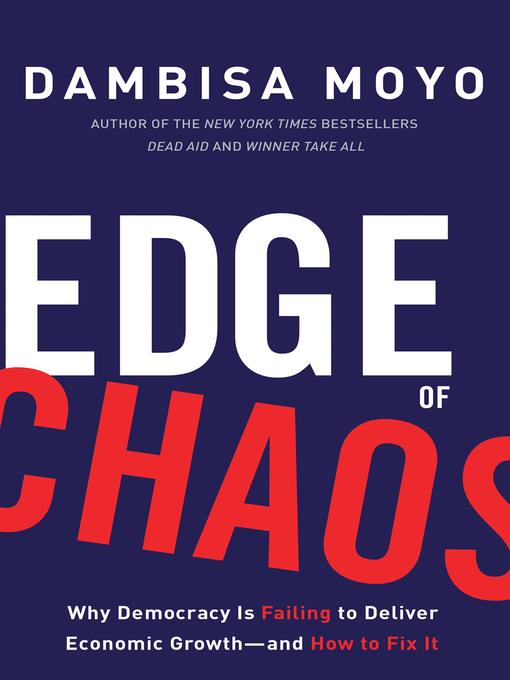
Edge of Chaos
Why Democracy Is Failing to Deliver Economic Growth-and How to Fix It
- اطلاعات
- نقد و بررسی
- دیدگاه کاربران
نقد و بررسی

February 15, 2018
Zambian-born economist Moyo (Winner Take All: China's Race for Resources and What It Means for the World, 2012, etc.) takes on thorny questions of economic and political stagnation.Is democracy an essential component of market freedom? No, writes the author. As the command economy of China demonstrates, "many aspects of how the Chinese political class manages its economy are antithetical to the Western values of democracy and free markets." That does not keep Western investors away, for China has demonstrated a commitment to things that Western democracies, by Moyo's account, have abandoned: the idea of constant economic growth and, with it, investment in infrastructure, health care, education, and other public goods that enhance political stability. By contrast, the West is ground down in stagnation, endemic poverty and inequality, and political unrest, all of which "suggest that democracy is not a prerequisite of economic growth." For Moyo, that economic growth is a sine qua non: without it, the developing world cannot attain developed status, and the developed world cannot flourish. Democratic capitalism may be preferred to other systems, but it has shortcomings that play out in the economic and political spheres. If democracies are to endure, she writes, then inequality must be combatted and elections need to be truly competitive and involve more than mere duopolies. The fundamental enemy of growth and democracy alike is "short-termism," behavior that ignores the long view in favor of immediate returns and gratification. For example, "a less politicized and more long-term-focused education policy would help circumvent the problem in which the United States ranks among the highest in terms of education spending per capita but in some respects is among the worst in education outcomes when compared against its advanced country peers." Although the writing is sometimes clunky and the argument repetitive, the author's program of remedy is provocative and of much interest to advocates of growth.Moyo clearly identifies systemic problems that the democracies--or what's left of them--would do well to address.
COPYRIGHT(2018) Kirkus Reviews, ALL RIGHTS RESERVED.

April 1, 2018
Since the 2008 financial crisis, most of the world hasn't exactly been living large. Economist Moyo (Dead Aid; Winner Take All) has some ideas on how to change that, arguing that in the past, liberal democracies of the kind found in the West were the best situated to deliver economic growth. However, in the new scheme of things, other political systems--notably authoritarian China--are delivering that growth. Economic development is a prerequisite to political stability, so the imperative for the United States and the West to reclaim their economic leadership is not simply to beef up the bottom line. Moyo drafts a blueprint for spurring growth by focusing on long-term goals instead of short-term, politically expedient fixes. She presents a spot-on analysis of the forces stagnating economic growth--and her proposals for political solutions, such as extended terms and performance incentives for elected officials, are compelling up to a point. However, some of her ideas (e.g., mandatory voting and weighted voting) will not likely sit well with the American public's interpretation of agency and egalitarianism in the political realm. VERDICT An intriguing partnership of economic policy and political reforms for solving stagnating economic growth in the West.--Carol Elsen, Univ. of Wisconsin, Whitewater Libs.
Copyright 2018 Library Journal, LLC Used with permission.




دیدگاه کاربران